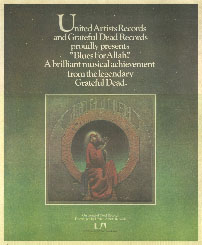![]()
  |

Blues For Allah
Grateful Dead
Grateful Dead GD-LA494-G
Released: August 1975
Chart Peak: #12
Weeks Charted: 13
 Blues for Allah contains quite a few surprises, some pleasant (Mickey Hart's reappearance; most of side one) and some embarrasing (most of side two), but at least the Grateful Dead have begun to awaken from the artistic coma they've been in since 1971. With their self-owned-and-operated record company fantasies biting the dust due to financially trying times and some decidedly uninteresting releases, the Dead have handed their distribution over to United Artists. They've also abandoned their tired philosophical stetsons and Old West daydreams in search of new frontiers. And though, on the basis of this record, one can't be totally convinced that it's better late than never, still, it's a good try.
Blues for Allah contains quite a few surprises, some pleasant (Mickey Hart's reappearance; most of side one) and some embarrasing (most of side two), but at least the Grateful Dead have begun to awaken from the artistic coma they've been in since 1971. With their self-owned-and-operated record company fantasies biting the dust due to financially trying times and some decidedly uninteresting releases, the Dead have handed their distribution over to United Artists. They've also abandoned their tired philosophical stetsons and Old West daydreams in search of new frontiers. And though, on the basis of this record, one can't be totally convinced that it's better late than never, still, it's a good try.
All of side one, with the exception of the final track, Bob Weir's ill-placed and tedious "The Music Stopped" (yet another "Playing in the Band" variation), works beautifully. It starts with the sad-eyed optimism of "Help on the Way," Garcia in fine form both vocally and on lead guitar, then flows into the instrumental "Slipknot!" with stellar playing by the entire band, waxes jaunty with the happy, bouncing "Franklin's Tower" and swings deftly through Latin-flavored, free-form connecting instrumentals, "King Solomon's Marbles" and "Stronger than Dirt or Milkin' the Turkey." The total effect is close to the Grateful Dead as they used to be, circe '68-'70.
 Click image for larger view. |
- Billy Altman, Rolling Stone, 10/9/75.
Bonus Reviews!
Innovative art seems ugly at first, eminent critics tell us, so the new Grateful Dead album isn't innovative art -- it doesn't seem ugly so much as inconsequential, so abstract as to be irrelevant, as if the players learned to read music and it interfered with their playing. The sound doesn't lean on the improvisational spirit of jazz, nor does it carry the vitality of rock. It is perhaps the normal thing that happens to hippies with Eastern thought freshly into their heads and Western nuance planted firmly, for a lifetime, in their bones. It is more interesting than Wake of the Flood, the other low-energy album of the recent past, sounding more "natural" (being richer melodically, too, which may be the same thing) where that one seemed esoteric the hard way. But this one doesn't really sound organic, balanced, centered -- which is, I suspect, one of the things the band, or at least Jerry Garcia, wants now. The lyrics, mostly by Robert Hunter, are unlinear, unspecific, nongraphic; and the the instrumental parts, as opposed to the old idea of a solo with back-up charging ahead on an idea parallel to the melody, are more a matter of concerted meandering. The trouble is, the sound on the record isn't as interesting as the talk we could have about the way the Dead are evolving. Or about the energy shortage in general.
- Noel Coppage, Stereo Review, 12/75.
First UA distributed set for the legendary band is a mix of shorter, more commercial material than the group has done in the past and the long, rambling yet coherent sort of thing we are used to hearing from them. Jerry Garcia's distinctive, almost slurring voice highlights side one along with his always excellent guitar work (both rock and jazz oriented, with the usual blues tinge). Vocals are a bit fuller with Donna Godchaux taking a major part and the Dead harmonies of Garcia, Lesh, Weir and Keith Godchaux working well. No radical departures form the past, which will please longtime fans. But younger, more Top 40 oriented buyers should also be attracted from the material on the first side. Best cuts: "Help Do The Way," "Franklin's Tower," "The Music Never Stopped," all of side two, which seems to run together and is ideal for FM play.
- Billboard, 1975.
I've been hypersensitive to this band's virtues for years. This time I find the arch aimlessness of their musical approach neurasthenic and their general muddle-headedness worthy of Yes or the Strawbs. C-
- Robert Christgau, Christgau's Record Guide, 1981.
Opening with the suite that has become a concert favorite, "Help on the Way"/"Slip Knot!"/"Franklin's Tower," and also containing the anthemic "The Music Never Stopped," Blues for Allah is another Grateful Dead album containing a few band classics and a lot of filler. Note, however, that some fans seem to like the filler. In its survey of Deadheads, DeadBase found Blues for Allah to be the band's most popular studio album after Workingman's Dead and American Beauty. * * * *
- William Ruhlmann, The All-Music Guide to Rock, 1995.
The Dead's muso masterpiece, perhaps their jazziest and most virtuosic set, was made during a rare hiatus from the road, at Weir's home studio. The catchiest songs are "Franklin's Tower" (whose central riff may or may not be an intentional echo of the signature "doo-doo-doo" reprise on Lou Reed's "Walk on the Wild Side") and "The Music Never Stopped," a funky strut with duet vocals by new band member Donna Jean Godchaux. But half the fun is the LP's spate of instrumentals: the curlicue speed trial "King Solomon's Marbles," the twining "Help on the Way" coda "Slipknot!" and the pastoral "Sage & Spirit."
- Will Hermes, Rolling Stone, 9/19.
![]() Reader's Comments
Reader's Comments
No comments so far, be the first to comment.
